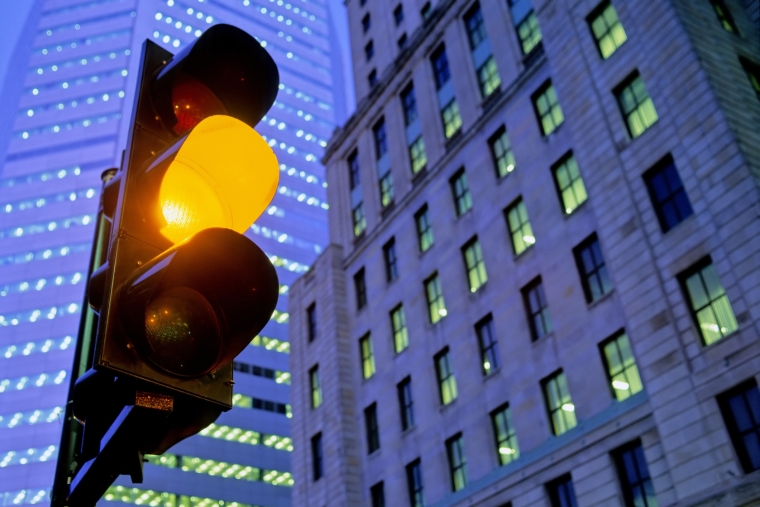
This is a re-post of the ANZ Truckometer report for December, here with permission.
The ANZ Truckometer indexes weakened markedly in December, with falls in seasonally adjusted traffic flows on nearly all roads used in the two indexes.
The Heavy Traffic Index fell 4.1% m/m on top of a 2.3% fall in November. It is now suggesting modest Q4 GDP growth. The Light Traffic Index fell 1.9% m/m, with recent reads consistent with the economy losing momentum.
The data is volatile, particularly the Heavy Traffic Index, and it is too soon to call a change in trend. But the Truckometer indexes are now clearly flashing warning lights about a slower growth path for the New Zealand economy.
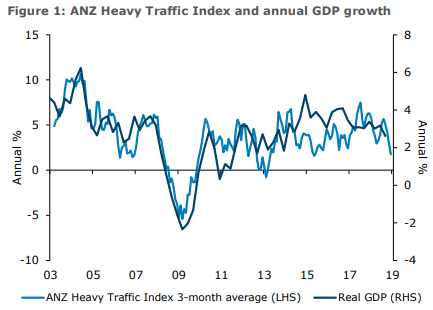
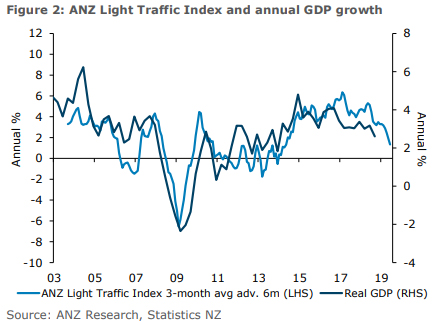
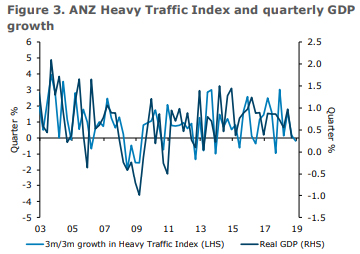
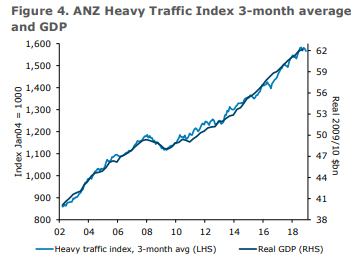
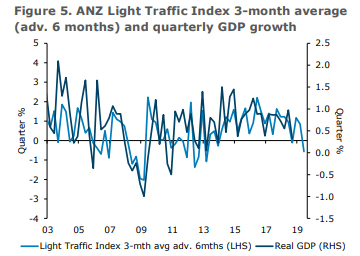
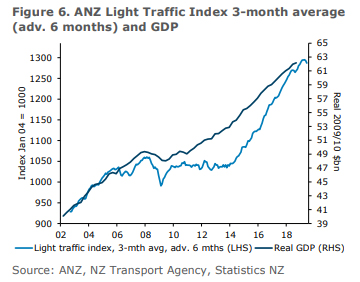
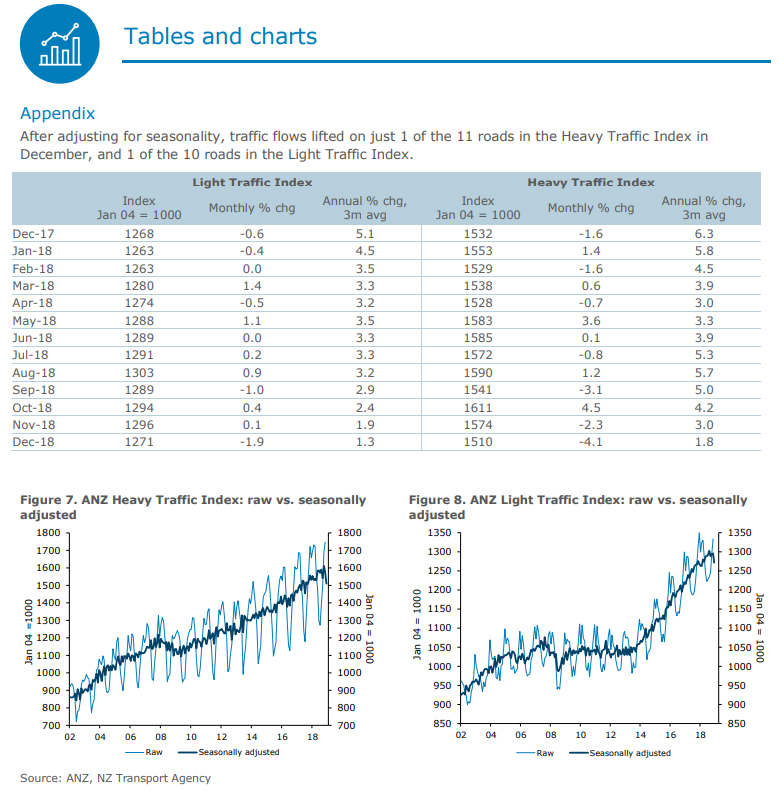
The original report is here.
37 Comments
A good friend is a truck driver in the Auckland / Waikato area carting bulk aggregates. Things went quiet for a period of about a week late last year so his boss got on the phone to other companies to see if they needed a hand, all he spoke with were in the same boat, one crowd with 10 trucks had 4 parked up. It's a pretty cut throat industry and you don't last long if the wheels aren't turning on a $400k truck
He was saying a bigger company with dozens of trucks will be struggling in 12 or so months time as their current work comes to an end and lack of forward work in the pipeline.
Interesting times in an industry already struggling with driver shortages, aging workforce, dodgy practices (ie: cooking log books) and increasing costs.
Getting all those trucks off our roads will be a great thing.
Reinvesting into the NZ Rail infrastructure will make our roads safer & be far more efficient overall, & get allhe ports lined up. Driving around Hamilton/Rotorua/Tauranga is very dangerous with so many trucks dominating on NZs narrow winding roads
And help motorists from paying 44% of their petrol price towards repairing our smashed up roads from the trucks.
Not to mention all the lost hours for people stuck behind lorries on the state highway and all the breaking and acceleration required to get passed them using up more petrol and causing more accidents!
Truck drivers aren't the probelm, they make the best speed they can, and get out of the way when there is a passing lane. Far more problems with car drivers that just don't have a clue or are self appointed road-cops.
Truck drivers not to blame, it’s the scale mismatch on the roads. It’s like underfoot puppies sharing trails with elephants.
"B-b-b-b-b-but it's the slow drivers that cause accidents."
I'm not suggesting that truck drivers are to blame, they don't dictate the speed of their lorries or the number of passing lanes, nonetheless, if freight moved to rail, it would reduce delays, road wear and tear and the speed at which we need to keep widening and updating roads.
Plus how many trucks have you seen over taking other trucks and blocking big chunks of road?
I don’t think there’s enough rolling rail stock to manage the bulk freight volumes. Logging trucks drive over the Remutaka Hill because rail is at capacity.
I’ve seen plenty plenty more drivers treat the passing lanes as drag strips, regardless of whether traffic is flowing at 100 - 120. Anything in front of them on the road is an obstacle/annoyance that they’ll bottle up until the next Stuff Article/Facebook post where they unleash a fictitious tirade on all the “70km/h slowpokes” out there causing crashes.
Really? Since when did they build a railway line to your local supermarket?
Rail to Ports, and Rail to dry ports / hubs would take most long haul trucks off the roads.
While, sure, local and short haul trucks can make targeted deliveries.
https://www.radionz.co.nz/national/programmes/insight/audio/2018672554/…
There is now a shortage of drivers, with growing numbers of immigrant drivers with accompanying safety issues.
Of course NZ has a large trucking industry lobby which is protecting the status quo.
25% of road deaths involving trucks.
I don't think GN is suggesting we rely on rail for last mile delivery.
Not directly, but they do cause the queues that as you say trigger the road ragers and make people take silly risks when overtaking. Life would better without the 70kph drivers and the 130kph everywhere drivers.
Getting all those trucks off our roads will be a great thing.
I'll miss them though, they're the only road users in NZ who seem to consistently drive safely.
In the South Island they are a protective life saver. Never be the front car travelling on SH1. If you can find a truck going in the same direction - get in behind and cruise there.
Just keep a safe following distance in case the trailer comes off...
Rail is too slow industry want their freight now.
A good point, and that's without unionised rail workers kicking up a fuss.
Railfreight is subsidised about one third by the taxpayer - around $300M per year, This would by 10-15km of four lane motorway every year - since yr 2000 we would have added 200-250km of motorway which would have saved lives and removed a lot of the problem with trucks delaying traffic.
Also a lot of the freight that go on rail due to the subsidies would otherwise go on the coastal RORO and container ships. So they wouldnt all end up on the road like the rail spruikers claim.
We need to call time on the rail freight joke in NZ - it's cost NZ billions over the years and for what?
with GDP coming in at 0.3 for the September quarter, and ANZs "truckometer" indicating that December is looking weak also, the pressure will begin to build on the government to turn things around. With Jacinda’s vast business experience I feel confident that we are in good hands. With Winston first there too, we are invincible. Wait a moment, what was Winnies election night comment again regarding the economy? …. The economy is 'not going to be good' Oh Dear!
vast business experience LOL
did you want a couple of fritters with your fush and chips?
I dont know how you can blame them really. Can anyone honestly say they thought the halcyon days of immigration and bloated house prices would last forever ? Maybe if you listen to the JK subliminal economic podcast while you sleep...
Wait for negative immigration when the economy turns and the exits overload with NZ "residents" to our mates in Aus, if I were the Aussies I would start building a wall, and make beijing pay for it.
yes sluggy a full blown recession sure beats the downside risk of positive net migration. Also if you haven't read house prices in Australia are heading south at a great rate of knots. To Australia's credit (or good fortune) they have as yet not blown their economy apart.
Unfortunately the modern citizen can’t handle a good old fashioned recession. So our cyclical recessions are masked by QE, ZIRP, mass immigration, and fiscal policy.
It is in a recession that you begin to appreciate the notion of owning or having use of land, to provide your own food.
Ah yes I remember 2008, when those lucky enough to have a quarter acre block reared pigs, while the rest of us starved to death.
its not a case of citizens not being able to handle a recession, its about ensuring the economy is robust enough that when times are tough we have enough "fat" in the system to soldier on. taxing may very well shore up the governments balance sheet, however it does not help the average punter out there. Labour pushed NZ into recession prior to the GFC, and they may well do the same again. Genius
Check out their budget deficit which looks like NZ National Debt.
I have a feeling we will be hearing a lot less of 'Oh Mr Speaker' from the Finance Minister in 2019 as he oversees the demise of GDP.
Will there come a time when the economy can't grow no matter what.Surely there will be a period when the economy is saturated and can't grow.
What ever will happen them.
Then the country simply accelerates immigration and derived immigration (international students).
see Tim Morgan
http://surplusenergyeconomics.wordpress.com/
"we need to start by distinguishing between two things. One is the “real economy” of goods and services. The other is the “financial economy” of money and credit.
The real economy is an energy system. Literally everything that forms part of the economy is a product of energy. Four criteria – three of them physical – determine how much goods and services we can produce. The first of these is the amount of energy to which we have access. The second is how much energy is consumed in the access process (measured here as ECoE). The third is the number of people between whom the resulting “surplus” (ex-ECoE) energy is divided. The fourth is how sensibly we organise ourselves within these parameters.
Logically, changes in the real economy take place gradually. Each of the three physical criteria changes slowly.
But the “financial” economy is capable of rapid change. Since money is a “claim” on the physical economy, the “two economies” are linked. In practice, though, it is all too easy for the financial economy to create “claims” (money and credit) which exceed what the real economy can honour. These “excess claims” can be destroyed very quickly. I estimate that the “excess claims” requiring destruction in 2008 totalled about $100tn. But we didn’t let this process of destruction occur. So we carried forward this $100tn, and have been adding to it at an accelerating pace. I put the current figure for “excess claims” at over $400tn.
These characteristics suggest that the financial system can collapse very quickly – indeed, it is hard to picture it failing slowly. The question then becomes: how much damage does this do to the “real” economy of goods and services? "
But we didn’t let this process of destruction occur. So we carried forward this $100tn, and have been adding to it at an accelerating pace.
Precisely. Capitalism hasn't failed us, we've just turned it into a weird form of socialism by bailing out the perpetrators and not letting the market self-correct. Why anyone should be surprised by the impending economic implosion is beyond me, yet here we are - buckle in and enjoy the ride.
I can pay someone $ 10 to dig a hole , and someone else $ 10 to fill it in again , and increase the GDP by $ 20.
Anyone who thinks we can keep growing at the ludicrous we have been needs their head read
In the case of our current "Government" a colonoscopy would be required.
Railfreight is subsidised about one third by the taxpayer - around $300M per year, This would by 10-15km of four lane motorway every year - since yr 2000 we would have added 200-250km of motorway which would have saved lives and removed a lot of the problem with trucks delaying traffic.
Also a lot of the freight that go on rail due to the subsidies would otherwise go on the coastal RORO and container ships. So they wouldnt all end up on the road like the rail spruikers claim.
We need to call time on the rail freight joke in NZ - it's cost NZ billions over the years and for what?
NZ Rail was sold to asset strippers during Rogernomics 1980s who made 100s of millions from stripping and reselling.
So after this intentional destruction (Rail being a scapegoat for Prebble etc) now the Rail system is trying to recover from this destructive period and various new owners.
We welcome your comments below. If you are not already registered, please register to comment
Remember we welcome robust, respectful and insightful debate. We don't welcome abusive or defamatory comments and will de-register those repeatedly making such comments. Our current comment policy is here.